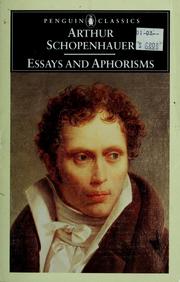Check nearby libraries
Buy this book

Schopenhauer believed that human action is determined not by reason but by 'will', and his writing demonstrates his innovative-and pessimistic-attitude towards human conduct.
Check nearby libraries
Buy this book

Previews available in: English
Showing 3 featured editions. View all 3 editions?
| Edition | Availability |
|---|---|
|
1
Essays and Aphorisms (The Penguin Classics)
May 30, 1973, Penguin Classics
in English
0140442278 9780140442274
|
zzzz
Libraries near you:
WorldCat
|
| 2 |
aaaa
Libraries near you:
WorldCat
|
|
3
Essays and aphorisms: selected and translated with an introd. by R.J. Hollingdale.
1970, Penguin Books
in English
|
zzzz
|
Book Details
Edition Notes
Selections from the author's Parerga und paralipomena.
Classifications
The Physical Object
ID Numbers
Source records
Scriblio MARC recordIthaca College Library MARC record
Internet Archive item record
marc_openlibraries_sanfranciscopubliclibrary MARC record
Better World Books record
Library of Congress MARC record
marc_columbia MARC record
harvard_bibliographic_metadata record
ISBNdb
Work Description
One of the greatest philosophers of the nineteenth century, Schopenhauer (1788-1860) believed that human action is determined not by reason but by 'will' - the blind and irrational desire for physical existence. This selection of his writings on religion, ethics, politics, women, suicide, books and many other themes is taken from Schopenhauer's last work, Parerga and Paralipomena, which he published in 1851. These pieces depict humanity as locked in a struggle beyond good and evil, and each individual absolutely free within a Godless world, in which art, morality and self-awareness are our only salvation. This innovative - and pessimistic - view has proved powerfully influential upon philosophy and art, directly affecting the work of Nietzsche, Wittgenstein and Wagner among others.
Community Reviews (0)
Feedback?| December 19, 2023 | Edited by ImportBot | import existing book |
| August 5, 2023 | Edited by Bonnyking | Edited without comment. |
| July 31, 2020 | Edited by ImportBot | import existing book |
| February 14, 2020 | Edited by MARC Bot | remove fake subjects |
| December 9, 2009 | Created by WorkBot | add works page |














